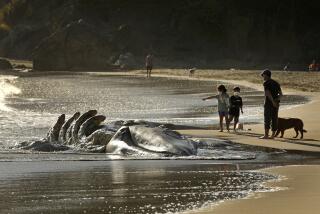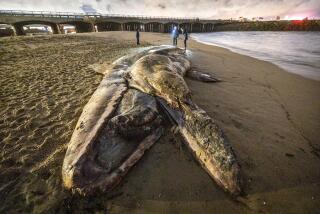35,000 walruses congregate on Alaska shore, face dangers as sea ice dwindles
An estimated 35,000 walruses packed a stretch of shoreline in Alaska late last month, a phenomenon that’s being chalked up to diminishing sea ice and alarmingly warm ocean temperatures.
The animals were spotted near Point Lay, Alaska, on the shores of the Chukchi Sea during NOAA’s annual aerial survey of Arctic marine mammals. The research flight that saw the walruses noted that no sea ice was evident in the area.
Pacific walruses have been hauling out on land in Alaska in the last six to eight years as summer sea ice has retreated, according to the U.S. Geological Survey.
Walruses must regularly pull themselves onto ice or rocks to rest. Because of the lack of sea ice, they’re simply hauling out on shore -- especially female walruses and their calves, USGS says.
In these on-shore haul outs, young walruses are more likely to be trampled, the USGS says. And all of the walruses may be negatively affected by having to use near-shore feeding areas rather than hauling out on ice amid rich feeding grounds.
On Sept. 17, Arctic sea ice reached its minimum for the year, according to the National Snow & Ice Data Center. It was “the sixth lowest extent in the satellite record and reinforces the long-term downward trend in Artice ice extent,” says the NSIDC.
The World Wildlife Fund says this was the largest walrus haul out ever recorded during NOAA’s annual aerial survey. The L.A. Times reached out to NOAA to confirm but had not heard back as of the writing of this post.
The sea ice minimum, although well below average, likely won’t hit the recordbreaking low of 2012, WWF noted in a statement. Lou Leonard, vice president for climate change, said the Arctic ice melt threatened the “long-term health of walrus and polar bear populations” as well as the annual migration of wildlife in the region.
This month, NOAA published a heat map showing “a persistent expanse of exceptionally warm water” in the Gulf of Alaska. The North Pacific Ocean hasn’t been this warm for this long since records have been kept.
“It’s super warm all the way across the Pacific to Japan,” NOAA oceanographer Bill Peterson said in a news release.
Follow me at @AmyTheHub







